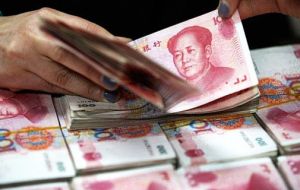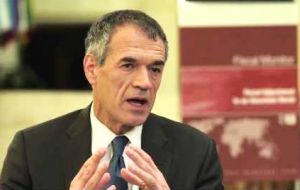MercoPress. South Atlantic News Agency
Chinese shares fall sharply on Monday; IMF says it's a “necessary adjustment”
 Beijing announced plans to let state pension funds invest in the market. Funds will be allowed to invest up to 30% of net assets in domestically-listed shares.
Beijing announced plans to let state pension funds invest in the market. Funds will be allowed to invest up to 30% of net assets in domestically-listed shares.  China's economic slowdown and fall in equities was not a crisis but a “necessary” adjustment for the economy, said IMF official Carlo Cottarelli
China's economic slowdown and fall in equities was not a crisis but a “necessary” adjustment for the economy, said IMF official Carlo Cottarelli  Last Friday, figures showed China's factory activity in August shrank at its fastest pace in more than six years.
Last Friday, figures showed China's factory activity in August shrank at its fastest pace in more than six years. Chinese shares continued their sharp fall on Monday as concerns over the country's slowing growth and volatile markets sparked panic among traders. The mainland benchmark index, the Shanghai Composite, fell sharply by 8.4% to 3,211.75 points, extending last week's losses.
The sell-off continued despite China's latest attempts to reassure investors. Over the weekend, Beijing said it planned to let its main state pension fund invest in the stock market.
Under the new rules, the fund will be allowed to invest up to 30% of its net assets in domestically-listed shares.
The fund will be allowed to invest not just in shares but in a range of market instruments, including derivatives. By increasing demand for them, the government hopes prices will rise.
The Hong Kong Hang Seng index followed the mainland's sharp decline, dropping 4% to 21,523.57 points in early trade.
Over the past week, China's benchmark Shanghai Composite fell 12%, adding up to a 30% drop since the middle of June. The sharp fall sparked a global sell-off, with the Dow Jones in the US losing 6%, while the UK's FTSE 100 posted its biggest weekly loss this year of 5%.
Earlier this month, the Chinese central bank devalued the Yuan in an attempt to boost exports.
Elsewhere in Asia, the region's biggest stock market, Japan's Nikkei 225 traded 2.8% lower at 18,907.39 points in Monday morning trade. It marks the Nikkei's lowest level in nearly five months. In Australia, the S&P/ASX 200 was down by 2.9% to 5,063.50 points. In South Korea, the Kospi index followed the region's lead, trading 1.4% lower at 1,850.56 points.
Over the weekend, the International Monetary Fund weighed in on the global sell-off in an attempt to avoid further market panic.
China's economic slowdown and fall in equities was not a crisis but a “necessary” adjustment for the economy, a senior IMF official said on Sunday.
“It's totally premature to speak of a crisis in China”, Carlo Cottarelli, IMF executive director representing countries such as Italy and Greece on its board, told a press conference, reiterating the international lender's forecast for a 6.8% expansion of the Chinese economy this year, below the 7.4% growth achieved in 2014.
On Friday, figures showed China's factory activity in August shrank at its fastest pace in more than six years.
This came after official figures showed the country's economic growth continuing to slow. For the three months to the end of July, the economy grew by 7% compared with a year earlier - its slowest pace since 2009.




Top Comments
Disclaimer & comment rules-

-

-

Read all commentsPoor Xi. He's trying his hardest to hold back the market forces and he's just getting sh@t on.
Aug 24th, 2015 - 10:55 am 0Couldn't happen to a nicer ar$ehole. Also looks like Brazil and China backs the wrong horse. Should have hitched yourself to the western growth model.
Anyway, in local news, resource companies have dropped from 1/3 to 1/6 of the ASX value which is a start of Australia's reorientation. Thanks to our lower dollar a tourism boom is underway already.
http://www.businessinsider.com.au/australias-tourism-sector-looks-set-to-boom-as-the-dollar-busts-2015-8
http://www.businessinsider.com.au/australias-tourism-sector-looks-set-to-boom-as-the-dollar-busts-2015-8
I recently posted comments stating that both Argentina and especially Brazil could do much more to incentivise inbound tourism, which are both extremely low by international standards.
Australia:
6.87 million visitors spent US$32 billion or US$4,657 each on average.
Argentina:
5.93 million visitors spent US$4.6 billion or US$775 each on average.
However read some of the replies by Enrique, Brasileiro and Paul's replies on their disdain for tourism.
http://www.businessinsider.com.au/australias-tourism-sector-looks-set-to-boom-as-the-dollar-busts-2015-8
China is going to drag down many more developing countries than developed.
As I've been saying, they can't stimulate themselves out of this mess. They also broke the 3500 index barrier that they were hoping to keep to avoid final capitulation.
Aug 24th, 2015 - 01:17 pm 0China has stolen 3 generations of wealth. It will take a long time for these families to save that much again.
I am not sure they're going to make it out of this
I think China will look much differently in the next decade.
Let's hope they can keep central control of their Military. If not all bets are off.
Canary in the coal mine for the emerging markets
Its going to get much worse very soon
Glad I'm in the USA.
Have any stock markets been immune today?
Aug 24th, 2015 - 05:10 pm 0Commenting for this story is now closed.
If you have a Facebook account, become a fan and comment on our Facebook Page!